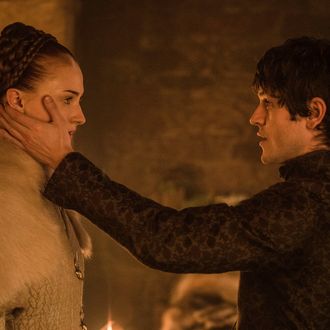
When Game of Thrones aired ÔÇ£Unbowed, Unbent, UnbrokenÔÇØ on May 17 last spring, it unleashed an outcry that had senators denouncing the show, viewers swearing not to watch ever again, and, later, one of the showÔÇÖs directors promising the series would change its approach to sexual assault in the future. The issue in question was a scene in which Ramsay Bolton rapes Sansa Stark┬áon her wedding night, a scene which happens to a separate character in the book series. In the showÔÇÖs soon-to-be released season 5 DVD commentary,┬áGame of Thrones┬áproducer and┬áthe episodeÔÇÖs writer, Bryan Cogman, addresses the filmmakersÔÇÖ perspective on the scene, according to EW. In CogmanÔÇÖs telling, after the creators decided to move Sansa back to her home in Winterfell, the scene, dark as it was, became inevitable. ÔÇ£When we decided we were going to [combine SansaÔÇÖs storyline with another characterÔÇÖs], we were faced with the question: If sheÔÇÖs marrying Ramsay, what would happen on her wedding night?ÔÇØ Cogman says.┬áÔÇ£And we made the decision to not shy away from what would realistically would happen on that wedding night with these two characters, and the reality of the situation, and the reality of this particular world.ÔÇØ
Though Cogman admits it might have been satisfying for Sansa to take control of the situation, and hints that she will have more control in future episodes, he argues that it simply didnÔÇÖt make sense for her to escape Ramsay at that moment. ┬áÔÇ£She goes [into the marriage] without the right information about Ramsay, she gets the sense that heÔÇÖs dangerous, and when he turns out to be even worse than she thought,┬áheÔÇÖs not broken by the attack,ÔÇØ He said.┬áÔÇ£She immediately sets to getting the hell out of there and planning her next move.ÔÇØ Cogman also defends the way which the scene was shot ÔÇö cutting to TheonÔÇÖs face as he observes the horror, rather than staying on Sophie Turner, who plays Sansa and is the victim. According to him, that strategy took best advantage of the limited filmic vocabulary available to depict this kind of scene:
Another argument  and I get why this criticism was leveled at us  is idea that we took Sansas story away from her and made it all about Theon [by cutting to his face at the end], he says. I personally dont believe thats the case  Certainly Theons redemption journey is an element of the subplot. But if you really watch this scene its played from Sansas viewpoint, for the most part. The main reason we cut away at the end, frankly, is that this was Sophies first scene of this nature, and we didnt want to show the attack. And so we cut to Theon to hear the attack. I understand why many people reacted to that, [thinking] we were making this scene about Theon and not Sansa. Im sorry it was viewed that way. All I can say is its certainly not my intention when I wrote it or when we were producing it  We could have stayed on her face of the entirety of the attack, that would have been a perfectly valid choice. To me it was about being respectful to Sophie.
Turner has defended the scene in the past and, as EW reports, her co-star Maisie Williams, who is on the commentary track with Cogman, also supported the showÔÇÖs decisions. This doesnÔÇÖt necessarily make those decisions any more palatable, but it does give you a sense of the difficultly of depicting such subject matter, which forms an essential ÔÇö though perhaps not always necessary ÔÇö part of the world of Game of Thrones.
The series returns April 24.


